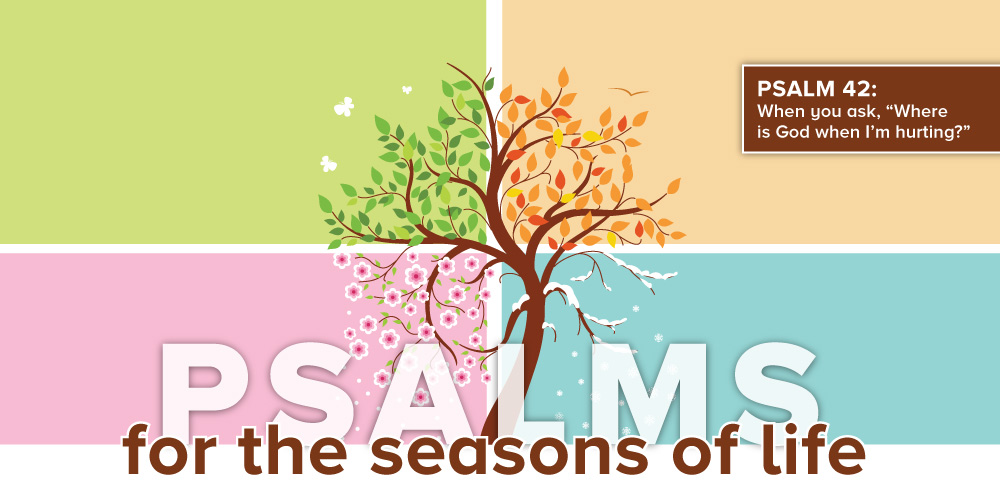 |
Do you know any super Christians, believers whose faith never stumbles on the road of life? But what about when the washouts and rockslides occur? Then we find out just how weak and easily discouraged we can be. Then the question may form on our lips, “Where is God when I’m hurting?”
Recognize our own weakness
The psalmist asked this same question. Some problem in life left him feeling as if the Lord had forgotten him. Like some deer running desperately through the wilderness, searching for any stream of water where it could bury its parched nose and splash its fevered flanks, so he thirsted for the Lord. Day and night, tears of discouragement flooded his eyes. The people around him didn’t help either. “Where is your God?” they taunted him. In the midst of his troubles, the psalmist felt “forgotten” by the only one who could take care of him (vv. 1-3,9).
Do you know the feeling? Ever ask, “Where are you, Lord?” when you can’t find a mate? When your job is in jeopardy? When daily life seems so humdrum and endless? When youthful dreams turn out to be soap bubbles that pop and disappear? When old age creeps up with its aches and pains and the promise of more to come? When you’re living in a home where problems exist between spouses? When wayward cells attack your body and sap your strength? When you stand out at the cemetery where a spouse of many years is resting?
The world offers some advice when troubles hit. It slaps us on the back and urges, “Grin and bear it.” Such advice views people as some sort of Tarzan swinging on a jungle rope above the swamp of trouble. But what happens when the rope breaks? What comfort is there in wrapping our arms in defeat over our head as trouble keeps hammering us?
Far better to remember the psalmist’s advice and turn to the One who can handle our troubles.
Rely on the Lord’s strength
That’s what the psalmist did. He wrote twice for emphasis, “Put your hope in God, for I will yet praise him, my Savior and my God” (vv. 5,11). “My Rock,” he called him (v. 9). The troubles that rain down on us in life are only pebbles in the Rock of ages’ hands. “The living God,” he also described him (v. 2). God is not some lifeless object like the security blanket we snuggled next to when we were little. He is the living God, more than real, more than near, more than able, more than ready to help us in any need.
“My Savior,” the psalmist named him (v. 11). Old Testament believers knew God not only as their helper with earthly problems but also as their Savior from sin. They knew him from the promises just as we know him from the performance. They looked forward to what he would do on Calvary just as we look back at what he has done. Such a God who promised salvation from sin’s curse in life and sin’s bondage in hell can certainly be trusted when we are hurting.
When troubles cause faith’s knees to buckle and discouraged hearts to ask, “Where is God?” we need to look to Calvary. When we see how God cared enough to prepare us for eternal life in heaven, we can trust him to get us through our passing life on earth. 
Other psalms for when you’re dealing with the question, “Where is God when I’m hurting?”: Psalm 27, Psalm 62, and Psalm 116.
This is the third article in a six-part series about the psalms’ guidance for our daily lives. Read the psalms with FIC in a new six-month Bible reading series.
Author: Richard Lauersdorf
Volume 110, Number 03
Issue: March 2023
- Psalm 103: When you count your blessings
- Psalm 91: When God lifts you up on his lap
- Psalm 4: When you draw nearer to the end
- Psalm 42: When you ask, “Where is God when I’m hurting?”
- Psalm 32: When you need forgiveness
- Psalm 130: When rocks fall
- Bible study: Freedom in service
- What does this mean for me? Article 6
- Bible study: Spiritual gifts
- What does this mean for me? Article 5
- What does this mean for me? Article 4
- Bible study: Rejoice in your status!
- Bible study: Baptismal blessings
- What does this mean for me? Article 3
- What does this mean for me? Article 2
- Bible study: Gifts of tongues and miraculous healing
- What does this mean for me? Article 1
- Bible study: Jesus is everyone’s Savior
- Bible study: Love one another
- Bible study: Above all things!
- Bible study: The comfort of God’s providence
- The book of James: Waiting for Christ’s return
- Bible study: Precious grace
- The book of James: Active in using prayer
- Bible study: Rewards of grace
- The book of James: Active in showing love
- The book of James: Correctly evaluating riches
- Bible study: What’s going to happen on the Last Day?
- The book of James: Avoiding loveless judging
- Bible study: Interpretation practice
- The book of James: Taming the tongue
- Bible study: The Bible’s attributes
- Bible study: The importance of the family altar
- Bible study: God’s attitude is grace
- Bible study: The Bible’s account of Easter morning
- Bible study: Different types of sin
- Bible study: God’s inspiration
- Bible study: Giving God glory
- Bible study: Judge for yourself
- The book of James: Using the Word of Truth
- Bible study: The need for the Bible and worship
- Bible study: Citizens of two kingdoms
- The book of James: Active in good works
- The book of James: When battling temptation
- Bible study: God cares
- Bible study: God made the world
- The book of James: When facing trials
- Bible study: A loving God saved people from hell
- The book of James: A blueprint for living out our life of faith
- A Bible story just for me: Guilt
- Bible study: God provides victory over death!
- A Bible story just for me: Anxiety
- Bible study: God forgives and refuses to remember our sins
- A Bible story just for me: Grief
- Bible study: God helps those who cannot help themselves
- A Bible story just for me: Depression
- Bible study: God has not grown soft on sin
- Bible study: Only one path leads to God’s presence
- A Bible story just for me: Trauma
- A Bible story just for me
- Bible study: God wants me in heaven
- Bible study: The incarnation of our Lord






